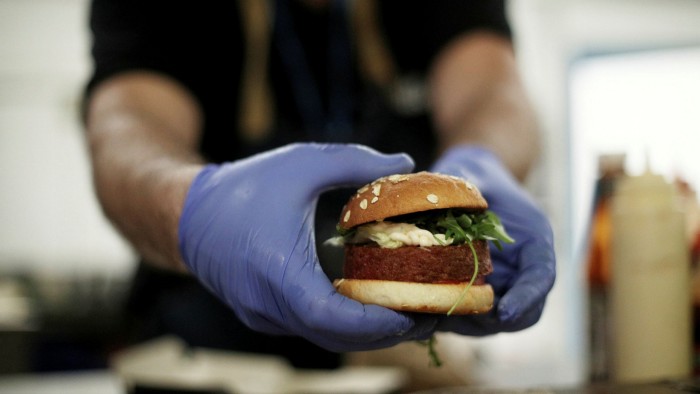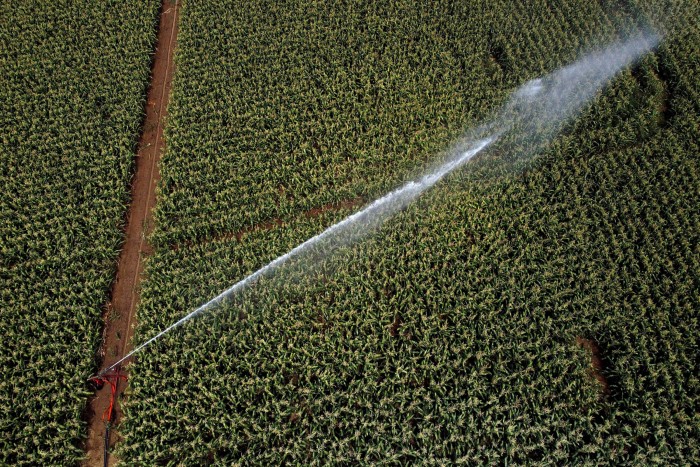Food proves hard for ESG investors to digest

Simply sign up to the ESG investing myFT Digest -- delivered directly to your inbox.
Food is at the nexus of practically every major sustainability issue: what we eat today determines not just our own health tomorrow, but also that of the planet. So the sector should be an obvious focus for ESG investors, who want their money to contribute to environmental, social and governance goals.
Yet while they have had some high-profile financial successes with companies such as Beyond Meat and Impossible Foods, which tout their plant-based products as eco-friendly alternatives to meat, ESG investors are finding it hard to incorporate food in their portfolios. Food businesses’ far-reaching impacts are difficult to measure, making it unclear whether they meet ESG criteria.
“The food industry is at the root of a much bigger set of challenges the world faces, but it’s not obvious,” says Andy Howard, global head of sustainable investment at asset manager Schroders. “There aren’t any sort of nice easy indices that you can make [like you can for] which companies have the most diverse boards.”
Unlike energy or utility companies, whose impact on the environment is relatively straightforward to quantify, food companies’ complex operations can leave investors scrambling to keep track of what they are doing. Their exposure to risk may also be much greater than appears at first glance.
While they may not emit that much carbon themselves, for example, their supply chains often do. Public health is another source of substantial risk. “When you look at the root causes of [many global health issues], refined sugar has emerged as being a big part of the underlying problem,” Mr Howard says.
Investors can study businesses’ marketing policies, favoured ingredients and innovation strategies to assess their long-term exposure to these risks. But the data is often imprecise and incomplete, which makes it hard to create investment products tailored for the sector. “In the end it comes down to the conversations that we have with companies and the knowledge that we have of those companies,” Mr Howard says.

Other market experts also point to a dearth of hard data. “The only place I would say ESG metrics may exist for food today is in the environmental bucket [as opposed to social and governance areas],” says Michael Waterman, chief executive of Canopy Holdings, a New York City-based food and agriculture holding company. But while there are some greenhouse gas reporting requirements in the US, companies are not required to disclose the granular data that ESG investors require to gauge their true environmental impact.
For example, Beyond Meat, despite its climate-centric marketing, provides very little information on its environmental impacts, according to a report from Trucost, an ESG data company owned by S&P Global Market Intelligence. In response, Beyond Meat told S&P that it “is starting the process of conducting a carbon-footprint assessment aimed at identifying opportunities to strengthen our environmental commitment and further reduce our impact”.
Still, it is not impossible for investors to make a difference, and many are ramping up their engagement efforts. Alison Taylor, chief sustainability officer at Archer Daniels Midland, says the US food processing company often hears from sustainability-focused investors.
Many funds are focused on a specific issue like human rights, deforestation or water conservation, she says. “They’re going to be very detailed and very specific and extremely knowledgeable about those areas and certainly their aim is to push us.”

However, the biggest pressure is coming from customers, Ms Taylor says. In the past, sustainability was often viewed as a “reputational” topic, she says, but now it is a serious growth opportunity. “It’s clear to us that consumers really want to know more about where their food is coming from . . .[and] what’s the impact of this food that I’m eating.”
Smaller, private investors like Mr Waterman’s Canopy also see this growing consumer demand. Hudson Harvest, a New York-based food distributor and the lone company in Canopy’s portfolio, owns a business called Field Goods that helps it link sustainable farms directly with consumers.
Food sold to grocery stores typically needs to have a longer shelf life and to meet certain “visual standards”, says Donna Williams, president of Field Goods. That makes it hard for small, sustainable farmers to compete with industrial producers, in spite of consumer demand. “[Sustainable food] needs a different distribution system,” she says. “A direct-to-consumer online business can eliminate those roadblocks.”
Some observers think a concerted effort is needed if ESG investors are to put their money to good use. Dariush Mozaffarian, dean of the Tufts University Friedman School of Nutrition, Science and Policy in Boston welcomes the surging demand for sustainable food but warns that this enthusiasm needs to be harnessed properly.
“Right now the savvy investor is stuck because they want to put their dollars towards sustainability and nutrition, and yet they don’t have a strong metric,” says Prof Mozaffarian says. “We need government, business, academia and non-profits to all come together to try to fix this.”
Whatever measures emerge, their consequences need to be rigorously thought through. “What I’m worried about is that if there isn’t sound science under [how companies are judged] we’re going to make a lot of big mistakes along the way,” he says. “This isn’t tobacco where we just want to get rid of a product. This is really complicated . . . If the changes aren’t science-based we could not do any good or we could even do harm.”
This article has been amended since first publication as it originally mis-stated Donna Williams’s job title and the relationship between Field Goods and Hudson Harvest

Comments